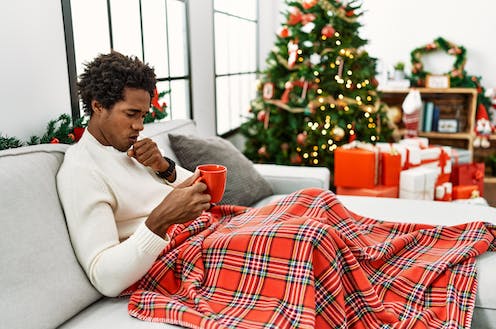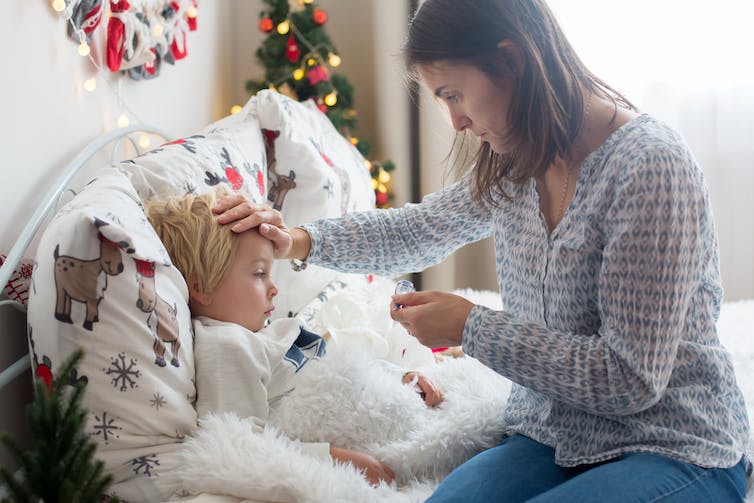
Krakenimages.com/Shutterstock
There’s a lot to be jolly about this Christmas. COVID has been significantly, although not completely, “defanged”, thanks to vaccines and treatments. Christmas dos, nativity plays and New Years Eve parties are all back on the festive calendar.
However, the return to “normal” brings with it the return of high rates of all the other winter bugs that were kept at bay largely due to reduced socialising during the previous two winters.
Along with COVID, northern hemisphere countries including the US and the UK are currently seeing or have recently seen large increases in influenza, RSV (respiratory syncytial virus) and the common cold.
Combined, these infections are leading to high numbers of hospital admissions and putting a strain on health systems.
Table of Contents
A social distancing debt
Some have spoken of a lockdown-induced “immunity debt”. This suggests a lack of exposure to seasonal viruses during the pandemic has inhibited our immune systems, leading to high rates of certain infectious diseases, especially among children. This hypothesis is controversial because at this stage there’s not enough evidence to support it.
I would argue that if anything, we’re seeing a “social distancing debt”. After two years of restrictions, UK data shows people have been mixing much more in the lead up to this Christmas compared with last year. It stands to reason that as socialising bounces back, so do the bugs.
So what should you do if you find yourself with symptoms on Christmas day?
Read more:
Our third COVID Christmas – here’s how things might play out
A cold or COVID?
In previous years, in many countries, there were laws, policies and guidance to follow around what to do if you were ill (although these were at times conflicting and confusing). This year, it’s pretty much down to personal responsibility and “common sense”.
I have previously argued that there’s no such thing as common sense regarding COVID – none us have lived through a pandemic before and we’re learning as we go. Certainly lockdowns and other stringent social distancing laws are, and should be, a thing of the past. But people continue to need guidance.
There is still COVID-related guidance out there, for example from the World Health Organization. Yet the challenge is knowing if you have COVID in the first place.
Part of the problem is how many COVID symptoms are common to other respiratory illnesses. The symptoms of newer COVID variants are no longer as distinctive as they were with the original strain (for example, a “continuous cough” or a loss of taste or smell).
The most common COVID symptoms now include a sore throat, runny or blocked nose, and a cough without phlegm. These are also common cold and flu symptoms.

Tomsickova Tatyana/Shutterstock
In short, if in doubt, buy a COVID test. Admittedly, this is easier said than done during a cost of living crisis (I would argue governments should try to make rapid tests free, at least during winters). Testing is the only way to know for sure if your cough or sneeze is due to COVID.
That said, although COVID has been particularly devastating over the past few years, respiratory diseases as a whole are worth preventing where possible. Taken together, COVID, flu and pneumonia still account for a significant proportion of all deaths in many countries, including the UK.
A hierarchy of protections
To keep ourselves and others safe this Christmas, we might draw on what I call a “hierarchy of protections”. This takes inspiration from a model used to manage workplace safety, the “hierarchy of controls”.
The model outlines five levels of protecting against hazards in the workplace. By substituting occupational hazards for respiratory viruses, we can use this model to guide our actions if we have symptoms – COVID or otherwise – at Christmas (or any time).
1. Protection by elimination: The only sure-fire way of not spreading an airborne illness is by not coming into close contact with anyone while infectious. But some people may not be able to self-isolate. Perhaps they need to care for loved ones this holiday season, or can’t face the prospect of another Christmas alone.
2. Protection by substitution: If we can’t eliminate our contacts when we’re sick, we can at least strive to reduce them, especially those who are clinically vulnerable. Meeting outdoors wherever possible is also a good idea. Viruses are much less likely to spread at outdoor carol services or Christmas markets than indoor ones.
3. Engineering protections: If we can’t meet outdoors (it is winter after all), then we can at least try to keep indoor spaces well ventilated, for example by opening windows and buying portable HEPA air filters).
4. Administrative protections: Where we need to meet, meeting briefly and avoiding physical contact like hugs and handshakes when sick can help.
5. Protection by PPE: In many countries, mask-wearing and even hand-hygiene practices have decreased considerably over the past year. But these are particularly important when sick. We can think of face masks like umbrellas, using them as and when needed.
Of course, some of these actions can be used in combination, and will depend on the context.
Read more:
Six common COVID myths busted by a virologist and a public health expert
Doing what we reasonably can to reduce the spread of respiratory viruses may mean some personal sacrifices this Christmas if you’re one of the unlucky ones to be unwell. But it will benefit your loved ones and public health more widely.
![]()
Simon Nicholas Williams has received funding from Senedd Cymru, Public Health Wales and the Wales Covid Evidence Centre for research on COVID-19. However, this article reflects the views of the author only and no funding bodies were involved in the writing or content of this article.
























